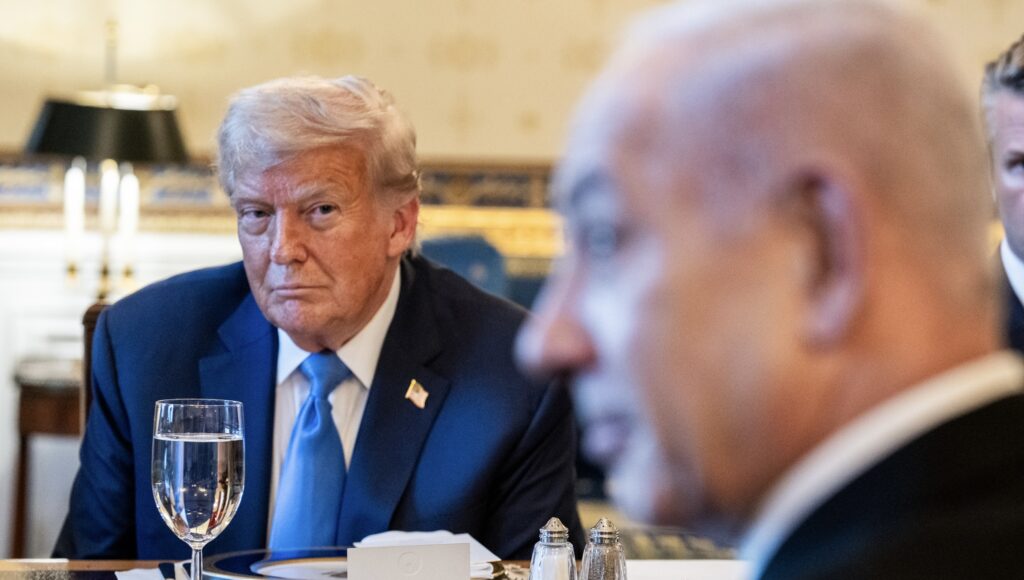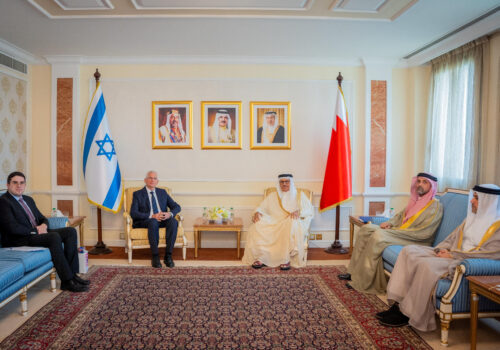For an increasingly isolated Netanyahu, it’s money time with Trump
One of Israeli Prime Minister Benjamin Netanyahu’s former benefactors, Sheldon Adelson, amassed his vast fortune at the helm of the famed Las Vegas Sands gaming empire. The apple didn’t fall far from that tree. The risky bets being placed by Israel’s longest serving premier—who raised the ante, again, by authorizing a direct attack on terrorist kingpins in Qatar on September 9—confirm that Netanyahu is a gambling man. And he’s taking recklessly long odds on US President Donald Trump, whose renewed blessing he hopes to win when they convene on September 29.
Israel, as it expands its military campaign in Gaza, is a nation deeply divided. Prospects of a deal to broker a ceasefire and secure freedom for hostages in Hamas captivity have pit its elected leaders, who are pressing to intensify Israel Defense Forces (IDF) control over the Gaza Strip, against a security establishment that favors acceptance of a proposal to halt the fighting. Parallel divides are evident among a deeply traumatized Israeli populace, where raging protests and counter-protests speak to an ideological chasm which is eroding cohesiveness within society.
On the political front, Netanyahu’s ruling coalition has been flailing since the departure of the Ultra-Orthodox United Torah Judaism and Shas factions from the government in July. Their return to the fold, for which Netanyahu is pining desperately, appears infeasible in light of their demand for a draft exemption whose preferential terms for yeshiva students will be rejected likely by both parliament and the courts. Meanwhile, Netanyahu’s already tenuous chances of surviving in office—his cohort has been lagging consistently in the polls—are being stretched further by the absolutism of his Religious Zionism and Jewish Power partners, whose cabinet ministers are lobbying aggressively for Israel to rebuff negotiations on a Gaza compromise and also to annex the entire West Bank.
Trapped between that rock and the hard place of growing international opprobrium, Netanyahu is playing his ace—or rather, his Trump—card in Washington to try and gain the upper hand. To a degree, Lady Luck has smiled upon him.

Engaging the president through a potent mix of effective diplomacy and flattering gestures, the prime minister has elicited a series of unprecedented moves from the Trump administration that align conveniently with his ambitions. Netanyahu’s frequent appearances on Trump-friendly media—the October 7, 2023 Hamas massacre in Israel that launched the war in Gaza would “probably not” have happened under Trump’s watch, he told the PBD Podcast last month—and his nomination of Trump for the Nobel Peace Prize are working their magic. Serious consideration of a US trusteeship for Gaza, the dispatch of US Air Force bombers to strike Iranian nuclear facilities and earlier indications that the US could back Israeli sovereignty in the West Bank are nuggets of the windfall. That said, Trump’s subsequent declaration on September 25 that he “will not allow Israel to annex the West Bank” implies a course reversal on that last score.
SIGN UP FOR THIS WEEK IN THE MIDEAST NEWSLETTER
But being all-in with Trump is an exceedingly dicey proposition for Israel. Even if Netanyahu has private assurances from the US president, wild cards abound. Trump has blindsided the prime minister on multiple occasions, including with decisions to pursue dialogue with Hamas and Tehran, cut an exclusive bargain with the Houthis, and impose steep tariffs on Israeli imports.
Netanyahu is not immune to Trump’s reprimand, either: “ISRAEL. DO NOT DROP THOSE BOMBS. IF YOU DO IT IS A MAJOR VIOLATION. BRING YOUR PILOTS HOME, NOW!,” he declared on his Truth Social platform as IDF fighter jets were speeding toward Iran in June.
US officials have been similarly riled by Israeli raids on Syria, where they are cultivating the new government headed by President Ahmed al-Sharaa, including through the removal of US sanctions on his country.
Trump, who has told the Daily Caller that Israel “may be winning the war, but they’re not winning the world of public relations,” has little tolerance for those he perceives to be “losers.” By that measure, his latest assessment that “Israel was the strongest lobby fifteen years ago that there has ever been, and now it’s, it’s been hurt, especially in Congress,” could spell serious trouble for Netanyahu.
The botched Israeli strike on US-allied Doha this month, from which Trump has taken pains to insulate himself—pronouncing that the attack “was a decision made by Prime Minister Netanyahu, it was not a decision made by me”—impaired Israel’s standing undoubtedly in the eyes of a US president who insists that the (White) House always wins.
That predicament is exacerbated by the fact that Israel is hemorrhaging support just about everywhere else. In the United States, it’s not only Democrats who are overwhelmingly critical of Israel’s performance, but loud swaths of the Republican Party now, as well. Prominent voices among the right-wing “America First” caucus—which holds cachet among the Trump administration’s isolationist branch—are encouraging the president to part company with Israel. Enthusiasm among the Republican Party’s under-fifty age bracket is also slipping markedly.
Circumstances are no less dire in other countries, where Israel has become a lightning rod for condemnation and boycotts. A drive to extend unilateral recognition of Palestinian statehood that commenced in the run-up to the United Nations General Assembly (UNGA)—Canada, Australia, and the United Kingdom made announcements to that effect already on September 21—continues to gain steam in world capitals.
None of this bodes well for Netanyahu as the IDF mobilizes sixty-thousand additional reservists for an exceptionally controversial takeover of Gaza City. Trump, with whom the prime minister has clashed over the veracity of reports attesting to starvation in the Gaza Strip, is fast running out of patience.
“I think within the next two to three weeks, you’re going to have a pretty good, conclusive ending,” he announced on August 25, adding that “I think we’re doing a very good job, but it does have to end.”
The US president’s wishes notwithstanding, IDF Chief of Staff Eyal Zamir—who estimated originally that maneuvers could continue there for at least five months—warned Netanyahu’s security cabinet on August 31 that the definite outcome of its strategy will be “military rule” of Gaza, possibly as early as November.
More alarm bells clanged on September 3, when Israeli Finance Minister Bezalel Smotrich presented his blueprint—on the letterhead of Israel’s Ministry of Defense, where he holds the settlement portfolio—for annexing 82 percent of the West Bank, triggering an immediate backlash.
The official response of the United Arab Emirates, which labeled the move “a red line” that would “foreclose the idea of regional integration,” cast the Abraham Accords, the signature achievement of Trump’s last term, into jeopardy. The president’s hopes of an imminent, formal peace agreement between Israel and Saudi Arabia are vanishing that much further into the rearview mirror.
With Israel’s future hanging in the balance, Netanyahu has put all of his chips on Trump. He’d best recall that the foray of the US president—whose third-largest 2024 campaign donation came from none other than Adelson’s widow, Miriam—into the casino business didn’t end well. And while the prime minister may believe that he’s won the jackpot, he doesn’t have an open tab in the Oval Office, where frustrations have peaked since Israel’s assault in Qatar. Matters could come to an explosive head shortly, if he balks at Trump’s anticipated twenty-one-point US program for Gaza’s future.
Netanyahu’s acknowledgement on September 15 that Israel, amid creeping diplomatic isolation, may have to transform itself into a “super Sparta” only underscores the gravity of the situation. Ending the war and scrambling to repair his relationships with other constituencies may be the only hedges left for him to safeguard that his wager on Trump doesn’t wind up bankrupting Israel.
Shalom Lipner is a nonresident senior fellow of the Scowcroft Middle East Security Initiative at the Atlantic Council. From 1990 to 2016, he served seven consecutive Israeli premiers at the Prime Minister’s Office in Jerusalem. X: @ShalomLipner
Further reading
Fri, Sep 19, 2025
How Israel’s strike on Doha is forcing a Gulf security reckoning
MENASource By
The Gulf monarchies have displayed strong unity at a time when rethinking twenty-first-century Gulf security is no longer optional.
Thu, Sep 18, 2025
Insights from Israel and the Gulf: An evolving regional integration
MENASource By
At a moment when the Abraham Accords is in question, we witnessed how the region moves quietly, sometimes boldly, towards cooperation.
Tue, Jul 29, 2025
‘I can barely stand or make it through the day’: First-hand views of Gaza’s starvation
MENASource By Arwa Damon
Israel has systematically denied aid entry into Gaza, and perpetuated false narratives intended to discredit the humanitarian community.
Image: Israeli Prime Minister Benjamin Netanyahu attends the 80th United Nations General Assembly (UNGA) at U.N. headquarters in New York City, U.S., September 26, 2025. REUTERS/Jeenah Moon


